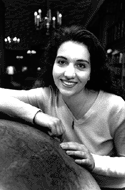 Berkeley
-- Fadia Rafeedie's parents, who immigrated from Palestine,
always stressed to her that education isn't a vehicle for
personal success, but for improving the lives of Palestinians,
wherever they live.
Berkeley
-- Fadia Rafeedie's parents, who immigrated from Palestine,
always stressed to her that education isn't a vehicle for
personal success, but for improving the lives of Palestinians,
wherever they live.
As she
completes her senior year at the University of California,
Berkeley, Rafeedie, a 22-year-old history major, certainly
knows success. She's earned all As, half of them A+s; had
some of her work published in a scholarly journal; and was
accepted to law school at Yale University.
Next week,
Rafeedie will be given another honor - the University Medal,
awarded each year to UC Berkeley's top graduating senior.
Chancellor Robert M. Berdahl will present the prize to her
on May 10 at Commencement Convocation, a ceremony for all
graduating seniors. Rafeedie will share the stage with U.S.
Secretary of State Madeleine Albright, the keynote speaker.
But despite
her accomplishments on campus, the undergraduate said she's
not the type to "be locked in an ivory tower. I love to search
for truth and meaning, but unless this is applied on the ground
level, it's not, for me, going to have a ripple effect."
While at
UC Berkeley, Rafeedie helped establish a local chapter of
the Washington, D.C.-based American-Arab Anti-Discrimination
Committee; wrote for the online newsletter, "Free Arab Voice;"
and was active in the Arab Student Union.
Rafeedie
also did extensive work with community organizations; planned
scholarly conferences; worked as a resident assistant and
security coordinator in the dorms; tutored high school and
college students; and participated in student demonstrations,
among other things.
After law
school, Rafeedie plans to become an activist-scholar, working
either in the United States or in the Arab world as an advocate
for the rights of the Palestinian community.
Rafeedie
was stunned to be selected as this year's University Medalist.
"I'm still
surprised," she said. "There is part of me still saying, 'You're
not deserving. There are a lot of brilliant people here.'"
A campus
committee selected Rafeedie from four other finalists after
an interview and a review of her grades, resumé, nominating
letters and three-page essay.
For Rafeedie,
getting good grades was simple because she was doing what
she loved - burying herself in schoolwork. With history as
her major, she minored in Spanish and Arabic.
"In a lot
of ways, it became a habit, to try your best on everything,"
she said. "It's not for the professor anymore, it's for your
own learning."
Rafeedie's
professors were dazzled by her papers.
Associate
professor of history Beshara Doumani, who had Rafeedie in
his course on the history of Palestine and the Arab-Israeli
conflict, said her weekly reports were so compelling that
he asked for a copy to keep for himself.
He called
her final essay a "tour de force."
"She managed
to locate just about every reference to Palestinian women
in both English and Arabic and produced a review that was
eventually published in the Berkeley Undergraduate History
Journal," Doumani wrote in his nominating letter.
Ten other
essays from Rafeedie appeared on the Web site of the Middle
East Social and Cultural History Association (MESCHA). Fadia
is the only undergraduate student who is a member of MESCHA
and one of the few members to have had work published on its
Web site.
Muhammad
Siddiq, an associate professor in the Near Eastern Studies
department, taught Fadia in two of his courses, "Styles of
Arabic" and "Cultural Encounters in the Novel." He considers
her one of the finest students he has had during his 20 years
of teaching.
"Both of
the papers she wrote for the course were exceptional and earned
her an A+, which was her final grade in both classes," Siddiq
wrote in his nominating letter. "For both papers she chose
controversial topics and argued them persuasively against
the grain of accepted 'expert' wisdom and the collective sentiment
of the class."
Though
her strong opinions may run counter to that of her peers,
admirers point out that her kind, considerate manner makes
her especially popular with peers and others. Individuals
stop her on the street to offer hugs. Some restaurant owners
refuse to accept payments from guests if they are "with Fadia,"
Doumani wrote.
Born in
Ohio, Rafeedie was raised in Southern California's San Bernardino
County. Her Palestinian parents immigrated to the United States
before she was born.
When she
was accepted to UC Berkeley, her family, including an uncle
who was confined as a political prisoner in an Israeli jail,
was excited and proud that she would attend a university known
for progressive ideals.
But, above
all, Rafeedie chose UC Berkeley because she fell in love with
its libraries, where she still happily spends hours buried
in books.
###